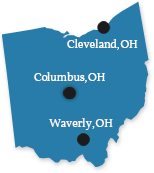Federal guidelines are laid out in the Fair Labor Standards Act. In Ohio, state labor regulations are handled by the Bureau of Wage & Hour Administration. Among other issues, these laws set a minimum wage, rules for lunch and breaks, rules for maternity leave, and more. They also set out the process for enforcing your rights if your employer breaks the law.
Claims about unfair pay, working hours, and other employment issues are called “wage and hour” claims. Essentially, you’re filing a claim to get money that your employer owes you. The laws surrounding wage and hour claims can be pretty complicated and your employer will have experienced attorneys to defend them. You need an experienced attorney like Plevin & Gallucci on your side, to make sure your rights are protected and that you get the compensation you deserve.
Your employer cannot legally retaliate against you for asserting your rights. Contact us to learn how Plevin & Gallucci can help you protect your rights.
MINIMUM WAGE
The minimum wage for non-tipped employees in Ohio is currently $8.70 per hour, though in some instances the federal minimum wage, $7.25 per hour, may apply. An employer must pay no less than the minimum wage for each and every hour worked.
For employees who receive tips, the minimum rate is $4.35 per hour. This rate plus tips must equal the minimum wage. Otherwise, the employer must make up the difference. For example, if you add in your tips and find that you’ve only made $7.00 per hour for a shift, your employer must make up the additional $1.35 per hour.
FULL PAY
You are entitled to full pay for the hours you work. This includes tasks performed on the way to or from work and work done at home. With certain exceptions, your employer is breaking the law by pressuring you into performing work for which you are not paid. If your job involves driving out to a work site, for example, your employer likely has to pay you for that time. Some employers will try to pressure workers to do more after they’ve clocked out or before they’ve clocked in – that is against the law. Your employer cannot, for instance, require you to come in and set up the restaurant before clocking in for your bartending shift.
If your employer utilizes a time clock to keep track of hours, they are allowed to round minutes to the nearest tenth or quarter of an hour only if this balances out in the long term. If they round down every time, that’s a violation of the law.
OVERTIME
A basic work week is 40 hours. If you work more than that, your employer must pay you at least 1.5 times your usual rate for every hour past 40. Note that your employer can force you to work overtime, within certain limits.
There are a number of jobs that aren’t covered by the overtime requirement. These are usually specialized jobs or management positions. Many people think that only hourly workers can qualify for overtime, not salaried workers. This is not true. Salaried workers may also qualify for overtime pay, although many employers do not advertise the fact or comply with the rules. If you’re salaried and working more than 40 hours per week and not getting overtime pay, the attorneys of Plevin & Gallucci can help you learn if you qualify for overtime pay.
CONTACT US
Plevin & Gallucci has always made it a priority to help workers throughout Ohio who have been hurt or taken advantage of by employers. Our founder, Frank L. Gallucci, Jr., was representing Cleveland workers from the day the law firm was founded more than 45 years ago.
Know your rights as an employee, and don’t let your employer take advantage of you. If they do, contact us to learn how we can help you.

